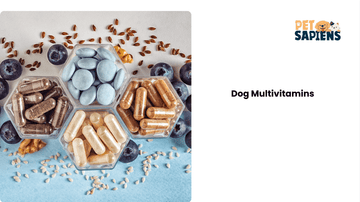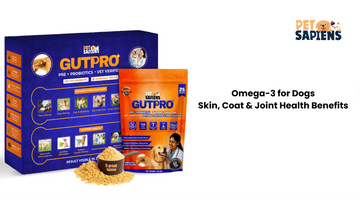Best Dog Multivitamins for Daily Health & Energy: A Complete Guide
by Nitish kajala on Oct 10, 2025

Every dog owner wants their furry companion to live a long, healthy, and energetic life. While a balanced diet forms the foundation of canine health, many dogs can benefit from the additional nutritional support that a quality multivitamin provides.
Understanding when your dog needs supplementation, which ingredients matter most, and how to choose the right product can significantly impact your pet's vitality, immune function, and overall wellbeing.
Why Your Dog Might Need a Multivitamin
Modern dog food has come a long way, with many commercial diets formulated to meet established nutritional standards. However, several factors can create nutritional gaps that multivitamins help fill. Dogs eating home-cooked meals, those with specific health conditions, senior pets, highly active working dogs, and even some dogs on commercial diets may not receive optimal nutrition from food alone.
The quality of commercial pet food varies dramatically. Budget brands often use lower-quality ingredients with reduced bioavailability, meaning your dog may not absorb nutrients efficiently even if they appear adequate on the label. Processing methods can also degrade certain vitamins and minerals, particularly heat-sensitive nutrients like B vitamins and vitamin C.
Individual dogs have unique nutritional requirements based on their age, breed, size, activity level, and health status. A multivitamin allows you to customize nutrition to meet these specific needs, supporting optimal health throughout every life stage.
Essential Vitamins for Canine Health
Understanding which vitamins dogs need helps you evaluate multivitamin formulations and recognize quality products. Here's a comprehensive breakdown of essential vitamins and their roles:
Vitamin A
Vitamin A is crucial for vision health, immune function, and maintaining healthy skin and coat. This fat-soluble vitamin acts as an antioxidant, protecting cells from damage and supporting proper growth and development in puppies. Dogs cannot convert beta-carotene to vitamin A as efficiently as humans, so they need preformed vitamin A in their diet.
Deficiency can lead to night blindness, poor coat quality, increased susceptibility to infections, and reproductive issues. However, excess vitamin A can be toxic, making proper dosing essential. Look for multivitamins providing vitamin A at levels appropriate for your dog's size and life stage.
B-Complex Vitamins
The B-vitamin family includes thiamine (B1), riboflavin (B2), niacin (B3), pantothenic acid (B5), pyridoxine (B6), biotin (B7), folate (B9), and cobalamin (B12). These water-soluble vitamins play critical roles in energy metabolism, nervous system function, red blood cell formation, and countless enzymatic reactions throughout the body.
Unlike fat-soluble vitamins, B vitamins aren't stored in the body and must be replenished regularly. Active dogs, seniors, and those under stress have higher B-vitamin requirements. Signs of deficiency can include lethargy, poor appetite, skin problems, and neurological symptoms.
Biotin deserves special mention for its role in maintaining healthy skin, coat, and nails. Many dog owners notice dramatic improvements in coat quality when biotin levels are optimized. Vitamin B12 is particularly important for dogs with digestive issues, as absorption can be compromised in cases of inflammatory bowel disease or pancreatic insufficiency.
Vitamin C
While dogs can synthesize vitamin C in their livers, supplementation can provide additional benefits, particularly for active dogs, seniors, or those recovering from illness. Vitamin C is a powerful antioxidant that supports immune function, helps synthesize collagen for healthy joints and connective tissue, and aids in wound healing.
Dogs under physical or emotional stress, those with compromised immune systems, and working dogs may benefit most from vitamin C supplementation. This nutrient also enhances iron absorption and supports the production of certain neurotransmitters.
Vitamin D
Vitamin D is essential for calcium and phosphorus absorption, making it crucial for bone health and development. Unlike humans who synthesize vitamin D from sunlight, dogs have limited ability to produce this vitamin through sun exposure and must obtain it primarily through diet.
This fat-soluble vitamin also plays important roles in immune function, cell growth regulation, and neuromuscular health. Deficiency can lead to rickets in puppies, osteomalacia in adults, and increased susceptibility to infections. Indoor dogs and those living in northern climates may be at higher risk for inadequate vitamin D levels.
Vitamin E
Vitamin E is the body's primary fat-soluble antioxidant, protecting cell membranes from oxidative damage. This vitamin is particularly important for immune function, skin health, cardiovascular health, and reproductive function. It works synergistically with selenium to provide comprehensive antioxidant protection.
Active dogs, seniors, and those with inflammatory conditions may benefit from enhanced vitamin E intake. This nutrient also supports healthy aging by combating oxidative stress, one of the primary drivers of cellular aging.
Vitamin K
Vitamin K is essential for proper blood clotting and bone metabolism. While dogs can obtain vitamin K from food and intestinal bacteria synthesis, supplementation ensures adequate levels, particularly for dogs on certain medications or those with digestive issues that may impair nutrient absorption.
Critical Minerals for Optimal Health
Minerals work alongside vitamins to support virtually every bodily function. A comprehensive multivitamin should include these essential minerals in bioavailable forms:
Calcium and Phosphorus
These minerals work together to build and maintain strong bones and teeth. The ratio between calcium and phosphorus is critical—imbalances can lead to serious skeletal problems, particularly in growing puppies of large breeds. Calcium also supports muscle contraction, nerve signaling, and blood clotting.
Most dogs on commercial diets receive adequate calcium and phosphorus, but those eating homemade diets often need supplementation. However, over-supplementation can be harmful, especially in large breed puppies, potentially contributing to developmental orthopedic diseases.
Iron
Iron is essential for hemoglobin production and oxygen transport throughout the body. Deficiency leads to anemia, characterized by weakness, lethargy, and pale gums. Female dogs, puppies, and dogs recovering from blood loss have higher iron requirements.
Iron should be provided in chelated forms for better absorption and reduced digestive upset. However, too much iron can be toxic, so proper dosing is crucial.
Zinc
Zinc supports immune function, wound healing, protein synthesis, and DNA production. It's particularly important for skin and coat health, with deficiency often manifesting as skin lesions, hair loss, and impaired healing. Certain breeds, including Siberian Huskies and Alaskan Malamutes, are prone to zinc-responsive dermatosis and may benefit from supplementation.
Selenium
This trace mineral works as an antioxidant alongside vitamin E, protecting cells from oxidative damage. Selenium also supports thyroid function and immune health. Deficiency is rare but can occur in dogs eating diets made primarily from ingredients grown in selenium-poor soils.
Magnesium
Magnesium participates in over 300 enzymatic reactions in the body, including energy production, muscle and nerve function, and protein synthesis. It also supports cardiovascular health and helps regulate calcium levels. Deficiency can cause muscle tremors, weakness, and cardiac issues.
Potassium
Essential for proper nerve function, muscle contraction, and fluid balance, potassium works in opposition to sodium to maintain cellular health. Dogs on certain diuretic medications or those with kidney disease may need potassium supplementation under veterinary supervision.
Additional Beneficial Ingredients
The best dog multivitamins often include ingredients beyond basic vitamins and minerals:
Omega-3 Fatty Acids
EPA and DHA from fish oil provide powerful anti-inflammatory benefits, support brain health and cognitive function, promote healthy skin and coat, and contribute to cardiovascular health. These essential fatty acids are particularly valuable for senior dogs, those with inflammatory conditions, and puppies during neural development.
Probiotics and Digestive Enzymes
A healthy gut is foundational to overall health. Probiotics support beneficial bacteria populations in the digestive tract, enhancing nutrient absorption, supporting immune function (approximately 70% of immune tissue resides in the gut), and promoting digestive comfort.
Dogs with sensitive stomachs, those on antibiotics, or pets experiencing stress benefit enormously from probiotic supplementation. Consider a dedicated probiotic and gut health supplement alongside your multivitamin for comprehensive digestive support.
Antioxidants
Compounds like vitamin C, vitamin E, selenium, and phytonutrients from fruits and vegetables combat oxidative stress and support healthy aging. Active dogs and seniors particularly benefit from enhanced antioxidant intake.
Glucosamine and Chondroitin
While not traditionally part of multivitamins, these joint-supporting compounds are valuable additions for active dogs, large breeds, and seniors. They help maintain cartilage health and joint mobility.
Choosing the Right Multivitamin for Your Dog
Selecting an appropriate multivitamin requires considering several important factors:
Life Stage Considerations
Puppies: Growing dogs have unique nutritional needs, particularly for calcium, phosphorus, and vitamin D to support proper skeletal development. However, over-supplementation in large breed puppies can cause serious developmental issues. Puppy-specific formulas account for these delicate balances.
Adult Dogs: Maintenance multivitamins for adults should provide broad-spectrum nutritional support without excess. Active adult dogs may benefit from formulas with enhanced B-vitamins and antioxidants.
Seniors: Older dogs often need increased antioxidants, joint support, and nutrients that support cognitive function. Senior formulas typically include higher levels of vitamins E and C, along with ingredients supporting aging joints and organs.
Size-Specific Formulations
Small, medium, and large breed dogs have different metabolic rates and nutritional requirements. Large breeds metabolize nutrients differently than small breeds and may need different ratios of minerals to support their bone structure. Size-appropriate formulas ensure proper dosing and optimal nutrient ratios.
Activity Level
Working dogs, sporting breeds, and highly active pets have elevated nutritional requirements compared to sedentary companions. Performance-oriented multivitamins typically include enhanced B-vitamins for energy metabolism, additional antioxidants to combat exercise-induced oxidative stress, and electrolytes to support hydration.
Health Status
Dogs with specific health conditions may benefit from targeted supplementation. Those with skin allergies might need enhanced omega-3s and biotin, dogs with joint issues benefit from added glucosamine, and those with digestive sensitivities need gentler formulations with probiotics.
Quality Indicators
Not all multivitamins meet the same quality standards. Look for these markers of superior products:
Third-Party Testing: Independent verification ensures the product contains what the label claims and is free from contaminants. Look for certifications from organizations like the National Animal Supplement Council (NASC).
Bioavailable Forms: Quality multivitamins use chelated minerals and active vitamin forms that dogs can easily absorb and utilize. For example, methylcobalamin is more bioavailable than cyanocobalamin for vitamin B12.
Appropriate Dosing: Products should provide clear dosing instructions based on your dog's weight and include nutrient levels within safe, beneficial ranges—not excessive amounts that could cause harm.
Transparency: Reputable manufacturers clearly list all ingredients with specific amounts. Avoid proprietary blends that don't disclose individual ingredient quantities.
Manufacturing Standards: Look for products made in facilities following Good Manufacturing Practices (GMP) with proper quality control measures.
Understanding Different Multivitamin Forms
Dog multivitamins come in various delivery formats, each with advantages:
Chewable Tablets
These are the most popular form, typically flavored to appeal to dogs. They're easy to administer, allow precise dosing, and most dogs accept them readily. Quality chewables use natural flavoring and avoid artificial colors or preservatives.
Soft Chews
With a texture similar to treats, soft chews are highly palatable and easy for dogs with dental issues to consume. They often incorporate the vitamins and minerals into a soft, gel-like base.
Powders
Powders can be mixed into food, making them ideal for picky eaters who refuse pills. They allow flexible dosing adjustments and are excellent for dogs requiring customized nutrient levels.
Liquids
Liquid multivitamins can be added to food or administered directly. They often have high bioavailability since nutrients are already in solution. However, they may be less convenient for travel and require refrigeration after opening.
Capsules
While less palatable on their own, capsules can be opened and contents mixed with food. They're useful for dogs sensitive to flavoring agents or those requiring very specific nutrient combinations.
Signs Your Dog May Need a Multivitamin
Watch for these indicators that your dog might benefit from supplementation:
Dull, dry coat or excessive shedding often indicates nutritional deficiencies, particularly in essential fatty acids, biotin, and zinc. A quality multivitamin can help restore coat health and reduce abnormal shedding.
Low energy or lethargy unrelated to illness may signal inadequate B-vitamins or iron. Dogs should be alert and energetic for their age and breed characteristics.
Frequent illness or slow healing suggests compromised immune function, which multivitamins containing vitamins A, C, E, and zinc can support.
Poor appetite can both cause and result from nutritional deficiencies. B-vitamins particularly influence appetite and metabolism.
Digestive issues like intermittent diarrhea or gas may indicate poor nutrient absorption, which comprehensive multivitamins with probiotics can help address.
Aging-related changes including reduced mobility, cognitive changes, or decreased vitality often improve with appropriate senior multivitamin formulations.
Implementing a Multivitamin Routine
Consistency is key to seeing benefits from multivitamin supplementation:
Starting Supplementation
Introduce multivitamins gradually, particularly for dogs with sensitive stomachs. Begin with half the recommended dose for 3-5 days, then increase to the full amount if no digestive upset occurs.
Timing and Administration
Most multivitamins should be given with food to enhance absorption of fat-soluble vitamins and minimize digestive upset. Some owners prefer giving supplements with breakfast to establish a consistent routine.
Monitoring Response
Keep notes on changes you observe after starting supplementation. Most dogs show noticeable improvements in energy, coat quality, or other areas within 4-8 weeks of consistent use.
Long-Term Use
Quality multivitamins are designed for daily, long-term use. Unlike medications, vitamins and minerals support gradual improvements in health rather than providing immediate dramatic effects.
Multivitamins and Complete Nutrition
While multivitamins provide essential nutritional insurance, they work best as part of a comprehensive approach to canine health. A high-quality daily nutrition supplement designed specifically for dogs ensures your pet receives optimal levels of all essential nutrients in bioavailable forms.
Combining a complete multivitamin with proper diet, regular exercise, mental stimulation, and routine veterinary care creates the foundation for a long, healthy, and energetic life. Think of supplementation as one important piece of the wellness puzzle rather than a standalone solution.
Special Considerations and Precautions
Consulting Your Veterinarian
Before starting any supplement regimen, discuss your plans with your veterinarian. They can evaluate your dog's current diet, identify potential deficiencies, recommend appropriate products, and ensure supplementation won't interfere with any medications.
Avoiding Over-Supplementation
More isn't always better with vitamins and minerals. Fat-soluble vitamins (A, D, E, K) can accumulate to toxic levels if over-supplemented. Quality multivitamins formulated for dogs provide nutrients at safe, beneficial levels, but avoid combining multiple supplements without veterinary guidance.
Breed-Specific Needs
Certain breeds have unique nutritional requirements or sensitivities. For example, Dalmatians metabolize purines differently and may need special consideration for certain minerals. Research your breed's specific needs or consult with a veterinarian familiar with breed-specific health concerns.
Interactions with Medications
Some vitamins and minerals can interact with medications. For instance, calcium can interfere with certain antibiotics, and vitamin K affects blood clotting medications. Always inform your veterinarian about all supplements your dog receives.
The Connection Between Gut Health and Nutrient Absorption
Even the best multivitamin provides limited benefits if your dog can't properly absorb nutrients. The digestive system plays a crucial role in breaking down, absorbing, and utilizing vitamins and minerals. A healthy gut microbiome enhances nutrient bioavailability, supports immune function, produces certain B vitamins and vitamin K, and protects against harmful bacteria.
Supporting digestive health through probiotic supplementation ensures your dog maximizes benefits from both their diet and multivitamin. A healthy gut is the gateway to optimal nutrition and overall vitality.
Realistic Expectations and Timelines
Understanding what multivitamins can and cannot do helps set appropriate expectations:
What multivitamins can do: Fill nutritional gaps in diet, support immune function, enhance energy and vitality, promote healthy skin and coat, support healthy aging, and provide nutritional insurance for overall wellbeing.
What multivitamins cannot do: Cure diseases, replace necessary veterinary care or medications, compensate for poor-quality diet, provide immediate dramatic changes, or substitute for proper exercise and mental stimulation.
Most dogs require 4-8 weeks of consistent supplementation before noticeable improvements become apparent. Some changes, like enhanced coat quality, may take even longer as new, healthier hair grows in.
Making Your Investment Count
Quality multivitamins represent an investment in your dog's long-term health. While premium products may cost more initially, they typically provide superior bioavailability, use higher-quality ingredients, require smaller doses due to better absorption, and deliver more noticeable results.
Consider the cost per day rather than the bottle price. A slightly more expensive product that delivers better results and requires less frequent replacement often provides better value than cheaper alternatives with questionable efficacy.
Conclusion
Choosing the best dog multivitamin for daily health and energy involves understanding your dog's unique needs, recognizing quality ingredients and formulations, selecting appropriate products for life stage and size, and maintaining consistent supplementation.
A well-formulated multivitamin supports your dog's immune system, energy levels, skin and coat health, joint function, and overall vitality. Combined with high-quality nutrition, regular exercise, mental enrichment, and attentive veterinary care, multivitamin supplementation helps ensure your beloved companion enjoys the longest, healthiest, most energetic life possible.
Your dog depends on you to make informed decisions about their health and wellbeing. By choosing quality supplements, maintaining consistency, and monitoring your pet's response, you're taking proactive steps to support their vitality at every life stage. The investment you make today in comprehensive nutritional support pays dividends in the form of more energetic play sessions, a lustrous coat, robust health, and precious extra time with your faithful friend.


